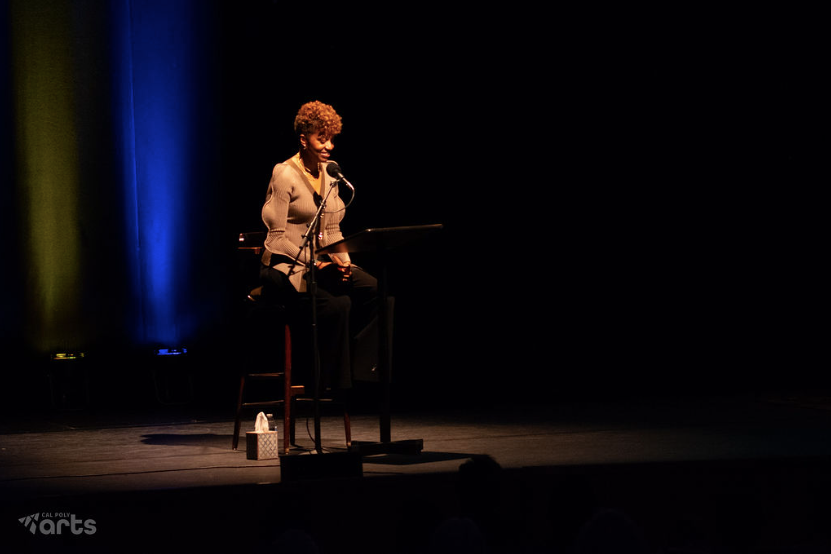
National Geographic Explorer discusses her memoir at Cal Poly
National Geographic Explorer in Residence Tara Roberts discussed her new memoir, “Written in the Waters: A Memoir of History, Home, and Belonging,” at the Performing Arts Center San Luis Obispo on Sunday to an audience of around 400 people.
The memoir details her experience working with other underwater archeologists to uncover slave wrecks along the Middle Passage, since joining the organization's efforts in 2018.
Donning an olive green top with curving fabric down the sleeves that resembled coral, Roberts stepped out from behind the veil of the PAC’s curtains, seemingly floating across the stage to her seat. Before diving into her life story, she spoke of her ritual of connecting with a space’s energy upon arrival.
“I think it’s important because this work is all about connection,” Roberts told the audience. “It’s connection to the past, it's connection to the future, it’s connection to each other and it’s connection to self.”
As a collective, attendees took three intentional breaths with Roberts, leaving the large, echoey auditorium washed in a silence akin to the muted sounds under the ocean’s surface.
Working with volunteer underwater archaeology group, Diving With a Purpose (DWP), Roberts has raised from the depths lost stories and histories that remain of slave ships wrecked between the 400-year-long transatlantic slave trade.
Diving off the coasts of Mozambique, Senegal, St. Croix and Key Largo, she has explored wreck sites like Christianus Quintus and Fredericus Quartus –– the two Danish slave ships that sank in 1710 off the coast of Costa Rica.
To revisit those stories is to revisit the trauma, Roberts acknowledged. But her work extends beyond that pain, and asks everyone to look at the past –– not skip over it –– and move through it to a new place, she said.
“When I’m under the surface, when I’m on the bottom of the ocean floor, I feel such power and agency,” Roberts said during the talk. “I feel so proud that I, along with these divers, historians, archaeologists, have raised our hand and said we are not going to wait for anyone else to prioritize this history.”
Though Roberts was not born an impassioned historian. She admitted to the crowd that throughout her childhood, she glanced over photographs her mother kept of their ancestors, as she was uninterested in hearing about their pasts and assumed they were filled with pain and suffering.
Instead, the Georgia-native devoted herself to books and stories that felt bigger than herself. As she got older, she worked as a journalist and in 2016, followed a job to Washington D.C. where the course of her life soon changed from the sight of one photograph.
It was hanging on the second floor of the National Museum of African American History and Culture, and showed a group of Black women standing aboard a boat, clad in wetsuits. They were divers with Diving With a Purpose.
“Time stopped,” Roberts said. Soon, she was getting scuba certified and flipping backwards into the ocean with the organization’s group of primarily Black divers –– embarking on a real-life quest, beyond those of her childhood books.
Since then, Roberts has produced a six-part podcast series titled “Into the Depths,” and in March of 2022, became the first Black female Explorer to grace the cover of National Geographic’s magazine.
“I listened to the podcast during COVID, and it was completely fascinating,” attendee Michelle Buehler said. “I started to actually do a deep dive into Clotilda.”
Clotilda, the last known slave ship that sailed in 1860 from present-day Benin, West Africa to Mobile, Alabama, is the focus of National Geographic’s documentary series “Clotilda: The Return Home,” which Roberts is featured in.
The African survivors, after they were freed from enslavement in 1865, went on to form the community of Africatown in Mobile, which still exists today. The book that both Roberts and Buehler pointed to was Zora Neale Hurston’s “Barracoon”, which features one of the last survivors of Clotilda, who discusses his experience coming to America and building a life in Alabama.
“It’s such a part of our history and we don’t talk about it,” Buehler said.
As Roberts wrapped up her presentation, she was joined onstage by Cal Poly history professor Thanayi Jackson, who dug deeper into certain topics and rounded out the conversation.
As audience members filed out of the auditorium and through the PAC doors with Roberts’ memoir tucked in their arms, a line formed for the book signing. Among the mix of scuba divers, marine biologists, historians, storytellers, students and the town’s locals stood history juniors Anna Johnson and Rebecca Inlander, who waited anticipatingly to meet Roberts
“The stories of slaves from the Atlantic Ocean are very powerful.” Inlander said, “ I’m really happy we are learning more about slave ships and the Middle Passage because it’s not talked about as much and our education systems don’t really value it as much as they should.”
With hopes to go into archives post-grad, history junior Anna Johnson noted the difficulty in finding, collecting and reading archives, which makes Roberts’ work so important.
“I think talks like this, and especially because [Roberts] has a podcast, are a great way to spread primary source information and disseminate it in a new way,” Johnson said. “It’s important to tell the story of these voyages, so you can’t gloss over them and create new narratives.”
Post a comment